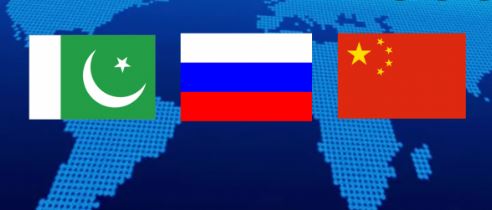Musaib Manzoor
To achieve integrated development, the SCO should stick to win-win collaboration to advance regional cooperation. Since its inception in 2001, Shanghai Cooperation Organisation (SCO) has emerged as a multilateral association to ensure security and stability in the Eurasian region. Targeting the region’s transnational security concerns and promoting economic cooperation among its members to contribute to regional stability are the two main areas of agreement. The SCO’s agenda has proven to be significant enough to its member nations’ leaders for it to become an integral aspect of Central Asia’s regional security and political architecture.
The SCO is a transcontinental political, economic, and security alliance that covers nearly 60% of Eurasia’s geographical area, 40% of the world’s population, and more than 20% of global GDP. Because of their territorial size, economic capability, military power, and role as permanent members of the UN Security Council, Russia and China are two of the most influential governments in the international system.
Regional developments such as the SCO have deepened the alliance between Pakistan, China, and Russia. This trilateral collaboration might have implications for US strategy in the Eurasian region if this coalition emerges to be effective.
Many Western experts see the SCO as a combined Russian–Chinese geopolitical tool formed in reaction to the United States’ expanding involvement in Central Asia. As a result, it is believed that the SCO is largely a geopolitical counterbalance to the US.
Security is the primary motivator for collaboration in the Shanghai Cooperation Organisation (SCO), and as cooperation has progressed, so has the SCO’s security priority. The SCO emphasises the ‘three evil forces’ – terrorism, separatism, and extremism – as the region’s key security issues, but cooperation also includes organised crime and illegal drug trafficking. Despite the SCO’s focus on non-state actors rather than interstate rivalry, the member states’ leaders believe that, like conventional security alliances, the SCO will help to maintain the stability of existing governments.
Recognizing the transnational nature of today’s terrorism and being at the forefront of the fight against its practical manifestations, SCO member states have embarked on a path of cooperation and active participation in global efforts to combat terrorism, particularly in the fight against its financing channels. The Regional Anti-Terrorist Structure (RATS) has created a unified legislative framework for the SCO’s actions that applies to all of the SCO’s member states’ territories. This is crucial for the formation of a coordinated strategy among the member nations.
The SCO’s objective has included cooperation among its members in the areas of security, economics, culture, and humanitarian aid. Many of these security dynamics are non-traditional in character, in that they are not triggered by other states, and hence do not operate on a typical state-to-state basis. As a result, they provide a unique set of challenges compared to typical interstate security ties.
The SCO Forum was established in 2006 as a consultative-expert mechanism that brings together the research and development and political science circles of the SCO member states. On 26 May 2022, Russia chaired the 17th SCO Forum meeting during which the participants discussed three main subjects in detail, namely, more intensive interaction between the SCO states in the field of international security, economic cooperation matters and expanded cultural and humanitarian cooperation.
China has pushed hard for the Shanghai Spirit to be implemented to create a more peaceful area. China is the SCO’s major financial sponsor, having contributed over $85 billion to the organisation. China campaigned for and practised a new security vision, supported the completion of the Convention Against Extremism, and assisted in the establishment of a training facility for international judicial exchanges between China and the SCO. In Yangling City, Shaanxi Province, China established an SCO demonstration base for agricultural technology training and exchange, as well as a China-SCO economic demonstration zone and a technology transfer centre in Qingdao, Shandong Province.
Russia, which is a major contributor has hosted five SCO summits. During Russia’s leadership, the SCO charter was prepared and signed. Russia contributed to the Three Evil Forces Convention, the 2004 Anti-Terrorist Agency, the 2009 Terrorism Convention, and the 2015-2025 development strategy.
Russia contributed to the formation of the Council of Businessmen and the Inter-bank Association, as well as a planned energy club and currency swaps. Russia was the driving force behind the establishment of the SCO University and advocated for increased environmental protection. Russia pushed for the SCO’s initial expansion, convened multiple international summits to resolve the Afghan conflict, and pushed for SCO-BRICS collaboration.
China is hopeful to reduce oil imports from the Middle East to half by 2030 under SCO‟s “Energy Club”. Thus, the SCO platform provides the People’s Republic of China to maintain its firm cooperation with Russia, Kazakhstan, and other Central Asian countries in the energy sector. Beijing has also signed multiple gas and oil pipeline projects with Russia, Kazakhstan, and Turkmenistan. The Sino-Russian East Line natural gas pipeline is under construction and was partially completed and brought into operation in 2020. This project is considered one of China’s largest gas pipeline projects starting from Russia and ending in Shanghai, passing through eight Chinese regions that cover a total of 3,371 km.
It may enhance and deepen the production chain at all levels of energy production and develop diverse methods of industrial collaboration by drawing on better models of energy cooperation between China and Russia and Central Asian nations.
The China-Pakistan Economic Corridor (CPEC), a flagship of the Belt and Road Initiative (BRI), which plays a vital role in Asia’s geopolitics, exemplifies the two countries’ ironclad relationship. At present, China is operating Gwadar Deep Sea Port located in Pakistan. The geographical location of Gwadar Deep Sea Port is important and far-reaching from China and BRI perspectives because it not only shortens China’s transportation routes but also reduces China’s dependence on the Malacca Strait
The interconnected projects of the “Belt and Road” will facilitate the linking and harmonizing of the development strategies of neighbouring states, freeing up the potential of the intraregional market, and stimulating investment and consumption, demand, and employment. Pakistan could become an energy and trade corridor to China if Islamabad can stabilize the country and safeguard the CPEC infrastructure from all possible threats and misadventures of its adversaries.
To achieve integrated development, the SCO should stick to win-win collaboration to advance regional cooperation. The plans shall include: upgrading cooperation rules and regulations from soft to hard constraints and establishing a rule-based platform for regional cooperation; guiding the transformation of project cooperation from government-led to market-led to upgrade the Belt and Road cooperation model; developing a diversified, multilateral financing and investment model; leveraging members’ comparative advantages for integrated Central and South Asian development; and increasing cooperation on terrorism.
It should increase non-governmental exchanges and personnel exchanges; strengthen educational cooperation and promote the SCO University; strengthen media and youth exchange to increase mutual understanding and trust; and cooperate in environmental protection, technology, and poverty alleviation while enhancing cultural and people-to-people cooperation.
*Musaib Manzoor is pursuing MS in Peace and Conflict Studies at Centre for International Peace and Stability, NUST Islamabad. He is also a Researcher at Legal Forum for Kashmir.

















